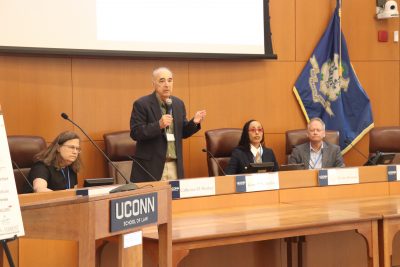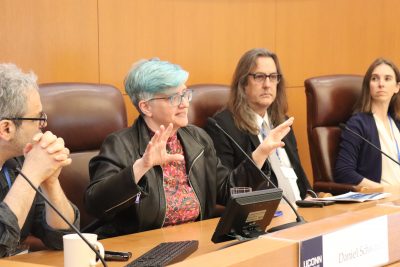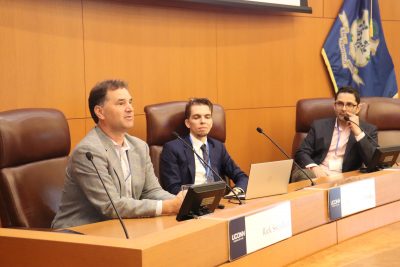UConn Law and University of Minnesota Successfully Host Groundbreaking Conference on AI and Insurance
HARTFORD, Conn. (May 31, 2025) – The Insurance Law Center at UConn Law, in partnership with the University of Minnesota Law School, successfully hosted a conference on “AI, Insurance Law, and Regulation” on May 30, 2025, at UConn School of Law’s Hartford campus.
The hybrid event brought together more than 200 leading academics, practitioners, regulators, and students to explore critical issues at the intersection of artificial intelligence and insurance law. Attendees participated both in-person and virtually, examining how AI is transforming the insurance industry and its regulatory landscape.
“The intersection of AI and insurance law raises profound questions that will shape the industry for decades. This conference was really exciting and unique. It brought together the field’s leading thinkers for focused, sustained dialogue rather than the fragmented discussions happening elsewhere. The energy in the room was extraordinary. You could feel that we were witnessing a pivotal moment that will influence how America regulates and insures AI risks for years to come,” said Travis Pantin, Director of the Insurance Law Center at UConn Law.
The day-long conference featured four expert panels addressing crucial topics including how insurance can influence AI development and liability frameworks, current and future insurance coverage for AI risks, discrimination and bias concerns in AI-powered insurance systems, and the use of generative AI in insurance coverage drafting and disputes.
Notable speakers included legal scholars from Yale, NYU, University of Pennsylvania, alongside cutting-edge industry leaders, and regulatory experts.
“We are excited to engage with this elite community to tackle the new AI insurance category with the best legal and academic minds in the world,” said George Lewin-Smith of Testudo, a new insurance company developing insurance coverage for AI risks..
The conference also offered a practical lunchtime session on using AI tools in legal practice, providing continuing legal education credits for attorneys.
“This conference has brought together leading voices in AI, insurance, and tort law for an impactful discussion,” said Renee Henson of the University of Missouri School of Law. “With insurance poised to play a central role in AI regulation, the conference arrived at a pivotal moment, one that will no doubt inspire richer, sharper scholarship in this rapidly evolving space.”
Tom Baker of the University of Pennsylvania Carey Law School added, “It was exciting to hear how insurance entrepreneurs are tooling up to face the threats and opportunities that AI will present.”
“The Connecticut Insurance Law Center brought together a coalition of informed, intelligent, and creative thinkers from a variety of perspectives to discuss Artificial Intelligence, the Law, and Insurance. Participating in this critically important discussion was a pleasure and honor,” said Joan Schmit of the University of Wisconsin-Madison.
Philip Dawson of Armilla AI Insurance and Risk Management said, “The conference, which featured leading scholars, legal and industry experts in AI, insurance, and liability, underscored that innovation in AI-specific underwriting and affirmative coverage is accelerating more rapidly than expected.”
The Insurance Law Center plans to publish selected conference papers in a special symposium issue of the Connecticut Insurance Law Journal, further contributing to scholarship in this rapidly evolving field.


